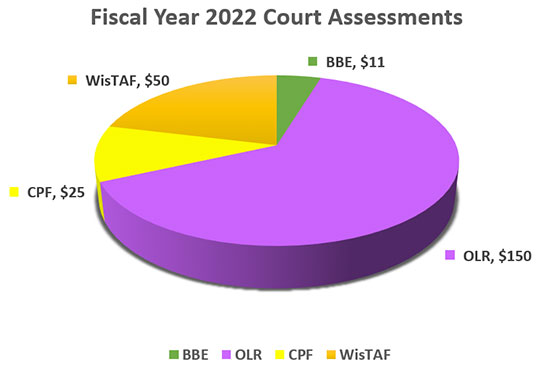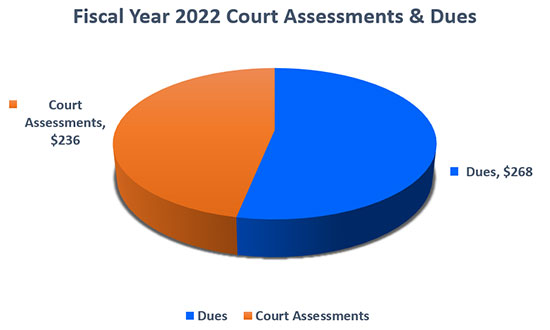May 5, 2021
– During the 2020-21 pandemic, your State Bar of Wisconsin worked diligently to
connect you with resources to help turn challenges into opportunities and
support the courts and the legal community in ensuring the continued
administration of justice – all while maintaining cost-effective operations.
As we look
ahead to a new year on July 1, you can count on the State Bar to help you
through the unprecedented change facing our profession, says Kathy Brost, State
Bar president. “We also want you to take advantage of everything your State Bar
membership offers to help you save time, money, and frustration.”
Members will
soon receive Wisconsin
Supreme Court assessments and State Bar of Wisconsin membership dues for fiscal
year 2022 (July 1, 2021, to June 30, 2022). These payments are due July 1,
2021.
State Bar
Dues Vary By Membership Class
For FY 2022,
the amount of your State Bar dues is based on your membership
classification:
- Membership
dues are $268 for Active and Judicial members.
- Active New
members (lawyers admitted to their first bar after April 30, 2019) and
Inactive members pay half dues of $134.
- Senior
Active members pay half dues of $134
- Nonvoting
Judicial members pay $179.
Emeritus
members continue to pay no State Bar dues. However, the Emeritus member classification
has recently changed. To learn more, see Emeritus
Membership FAQs.
Each member
may deduct the portion of their dues that pays for the State Bar’s legislative
activities, also known as the Keller dues reduction. That amount totals
$7.15 for FY 2022 (varies by membership class).
Supreme
Court Assessments: What Do They Support?
State Bar membership
dues are distinct from annual assessments established and imposed by the
Wisconsin Supreme Court. To
assist the Supreme Court and avoid duplication of efforts, the State Bar
collects court assessments in addition to your annual dues.
Court assessments for FY 2022 total $236. These assessments
support the following:

* The court
assesses active-licensed attorneys and judicial members $50, paid to the
Wisconsin Trust Account Foundation, to fund civil legal services for people who
cannot afford an attorney.
Not all
member types pay the full court assessments. To find out more information,
see Maintaining
Your Membership on WisBar.org.
State Bar Dues Increase 3
Percent
After a rigorous budget review to ensure all activities are
cost-effective and relevant, State Bar dues will increase $8 for full
dues-paying members in FY 2022, a 3% increase over FY 2020. There was no dues
increase in FY 2021, and the last dues increase was $2, approved two years ago
for FY 2020.
Although the Finance Committee had
recommended a $4 increase last year for FY 2021, the State Bar’s Board of Governors
turned to its reserves to balance the budget rather than increase dues during
the 2020-21 pandemic year. While current financial success during the pandemic has remained possible given a larger expense savings in comparison to a smaller revenue shortfall, post-pandemic those expenses are expected to outpace any hoped-for rebound in revenues as well as typical inflationary factors.
At the unanimous recommendation of
the Finance and the Executive committees, the Board of Governors voted to
increase dues to maintain the current level of member services and programs.

Ways to
Pay: Online, by Mail, or by Phone
Fully
enrolled State Bar members in good standing may pay their court assessments and
dues online, from a computer or mobile device with a credit card. For more
information about paying dues online, view FAQs: Paying
Your Assessments and Dues.
Members will
receive their statements via the USPS, unless they opted out of the first
mailing, preferring to receive notification by email. Members who opt not to
receive a paper statement will receive an email informing them that the Online
Dues Portal is open, with links for access and instruction on using the portal.
Payment is
due by July 1, 2021; pay by this date to avoid late fees.
Methods of
payment include:
- Via a
print statement received in the mail or by download at wisbar.org/mydues;
- Online
with a credit card by visiting wisbar.org/mydues; or
-
By phone in May, June, and July by
calling Customer Service at (800) 728-7788.
Who Can
Pay Court Assessments and Dues Online?
Fully
enrolled attorneys in good standing – those who have a Bar card – may pay
online.
You cannot
pay your dues online if:
- You are a
new member who joins on or before July 1, 2021;
- You want
to change your name or membership status;
- Your
membership is suspended; or
- Your
office participates in the firm billing program.
After
remitting payment, you can visit myStateBar to
verify that the State Bar has processed your payment. Your receipt and membership
card should arrive within two weeks from the date the State Bar receives
payment.
Questions?
See Membership FAQs and Paying Your
Assessments and Dues FAQs on WisBar.org or contact Customer
Service at (800) 728-7788 or service@wisbar.org.
Discover
the Benefits of Membership
The State Bar is here to help you
succeed. Membership comes with access to exclusive benefits – a compelling mix
of products, services, and discounts that help you advance your practice and
meaningfully engage with the legal community.
Products
such as FastCase, a $995/year value, and the Ethics Hotline, a $300/hour value,
are just two valuable resources to help members save time and money.
Advance your
practice, enrich your career, and improve the quality of your personal and
professional life. Take 15 minutes to discover
the benefits of membership. We’re sure you’ll find a benefit that
will help you save time, money, and frustration.
Are My
Dues Tax Deductible?
Supreme
Court assessments and State Bar dues are not deductible as charitable
contributions but may be deductible as business expenses. Internal Revenue Code
section 6033(e)(1) requires certain organizations to notify members that a
portion of dues is allocable to lobbying activities. We are uncertain whether
the requirement applies to the State Bar of Wisconsin. If it does, your Bar
card mailing will outline this percentage. See the Dues FAQs on
WisBar.org or the instructions with your mailed dues statement for more
information.
If you made
a donation to the Wisconsin Law Foundation or paid your Fellows pledge, these
payments are 501(c)(3) charitable contributions; receipts will be issued from
the Wisconsin Law Foundation.
Keep
These in Mind
Here are a
couple of things to keep in mind when completing the assessments and dues statement:
-
Please self-identify
in the demographic data section. The Diversity Inclusion and Oversight Committee
seeks to better understand and serve an increasingly diverse membership.
Please take the time to read the insert accompanying the printed dues
statement, and provide or verify demographic data collected in support of
the State Bar’s commitment to diversity and inclusion.
-
Be sure
to sign the trust account statement to retain your license – and your
permanent notary commission. The Supreme Court rules require that every lawyer
and judge sign this statement, regardless of whether you maintain
a trust account.
-
Suspensions
may impact your permanent status as a notary public. Failure to accurately and
timely submit the trust account statement may result in loss of permanent
notary public status. The Department of Financial Institutions (DFI) may
suspend permanent notary commissions of attorneys who are suspended from
the practice of law. This means when you are reinstated, you must reapply
for a four-year notary public commission and will continue to be
reappointed in four-year increments. This matter is solely within DFI’s
discretion.
Questions?
Contact State Bar Customer Service at (800) 728-7788 or email service@wisbar.org.
Remember
the Wisconsin Law Foundation on Your Dues Statement
Please
consider a gift to help support the Wisconsin
Law Foundation. Any level of contribution is gratefully appreciated.
You can make your donation via Line 9 of your dues form.
Your support
goes directly towards supporting worthy statewide programs like:
- High
School Mock Trial;
- programs
that enhance and support diversity in the profession;
- scholarships
to assist news lawyers with debt and establishing their practice; and
- grants to
innovative programs that improve the justice system.
To find out
more about what the Foundation does, see
the newsletter on WisBar.org.
